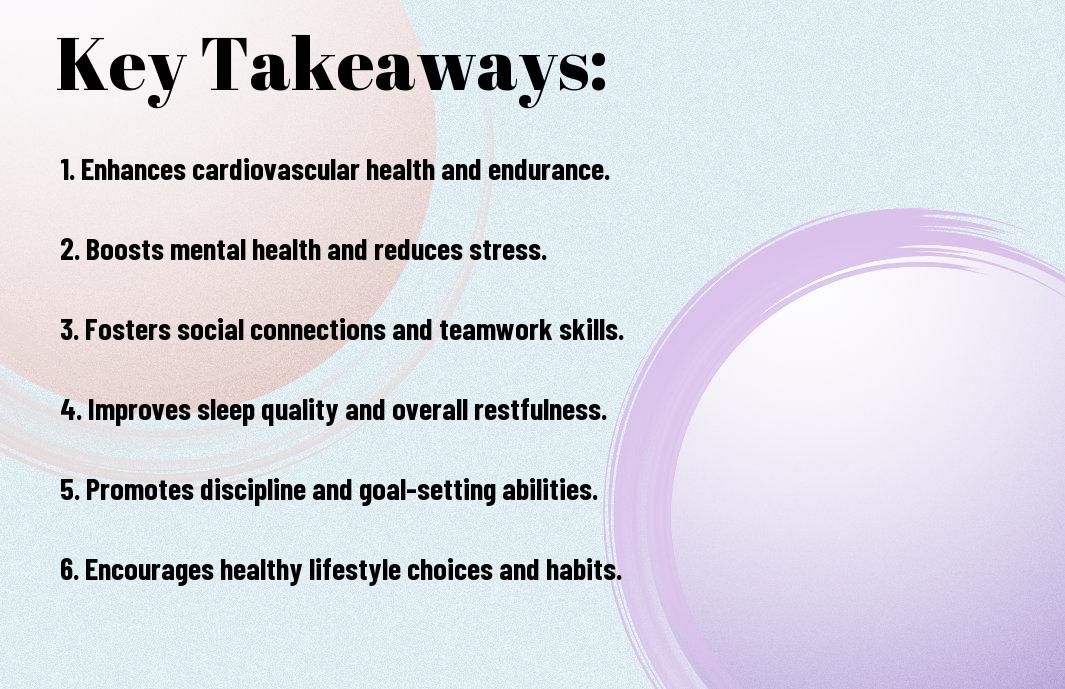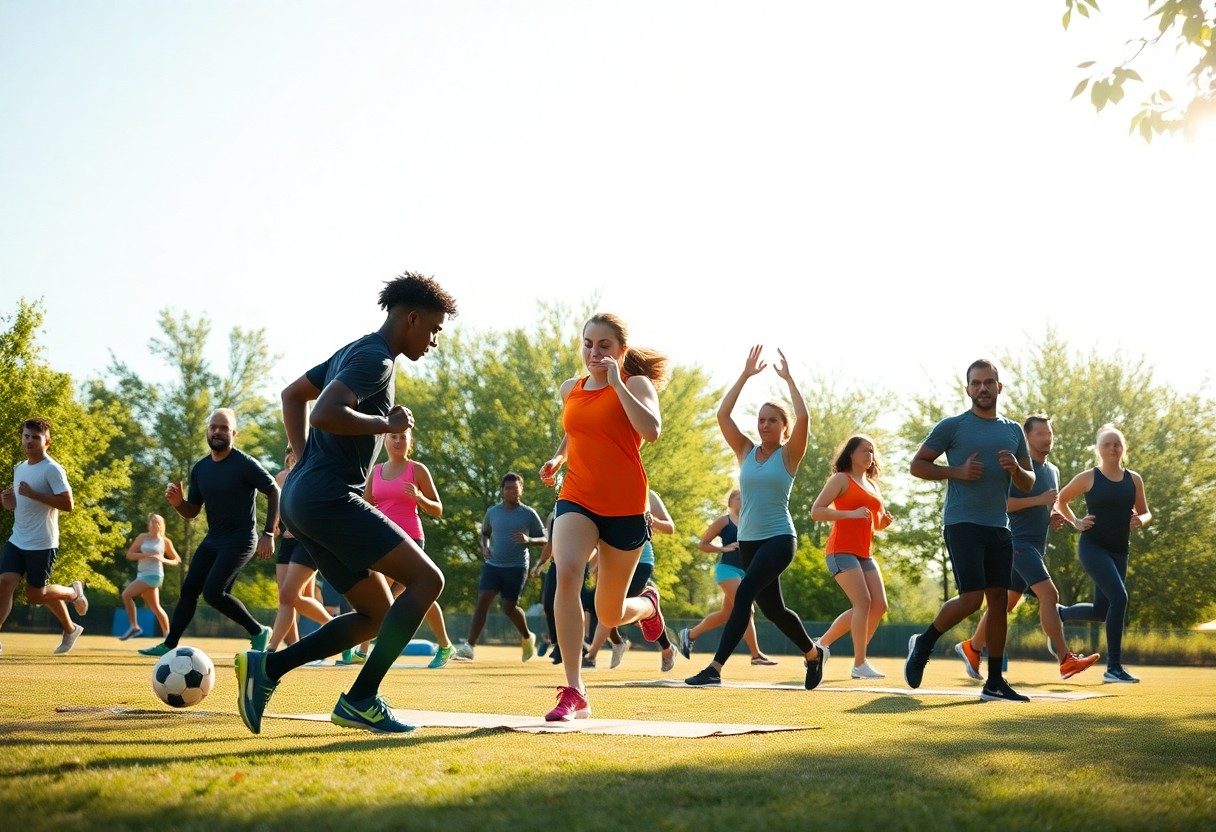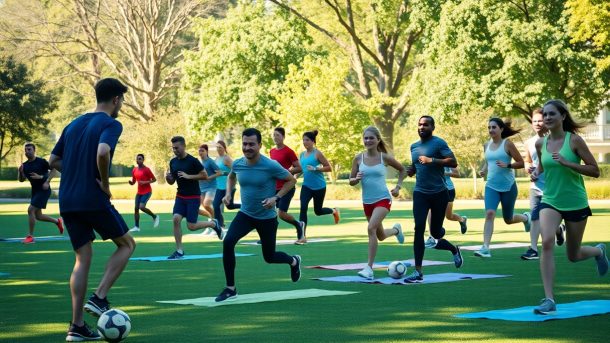Just engaging in sports can significantly enhance your overall wellbeing, providing both physical and mental advantages. You experience increased fitness levels, improved cardiovascular health, and a boost in your immune system. Moreover, participating in sports fosters social connections and develops teamwork skills while alleviating stress and anxiety. If you want to explore these benefits further, check out the Benefits of Sports for Adolescents, which highlights the positive impact sports can have on young athletes.
Key Takeaways:
- Physical Health: Engaging in sports helps improve cardiovascular fitness, increase strength, and maintain a healthy weight.
- Mental Wellbeing: Participation in sports can reduce stress, anxiety, and symptoms of depression, contributing to better mental health.
- Social Skills: Team sports foster communication, teamwork, and relationship-building, enhancing social interactions.
- Discipline and Goal Setting: Sports instill a sense of discipline and the ability to set and achieve goals, valuable in personal and professional life.
- Lifelong Activity: Engaging in sports encourages a love for physical activity, promoting a lifelong commitment to fitness and health.

Physical Health Benefits
Your participation in sports provides numerous physical health benefits that enhance your overall wellbeing. Engaging in regular physical activity can improve your cardiovascular health, maintain a healthy weight, and increase your strength and flexibility. These elements not only contribute to a healthier body but also elevate your mood and boost your energy levels, making you feel more vibrant in your daily life.
Cardiovascular Fitness
On the whole, sports can significantly boost your cardiovascular fitness. Engaging in activities like running, swimming, or cycling elevates your heart rate, leading to improved circulation and reduced risk of heart disease. As you build endurance through consistent participation, you’ll notice increased stamina, allowing you to handle physical tasks more effectively and with greater ease.
Weight Management
Below maintaining a healthy weight is another significant benefit of engaging in sports. Physical activity helps you burn calories and build muscle, both of which are crucial for effective weight management. Regular participation not only helps you control your weight but also supports overall metabolic health.
At its core, weight management is about balancing the calories you consume with the calories you expend. When you participate in sports, you enhance your ability to burn off excess calories while fostering a healthy lifestyle that includes proper nutrition. This combination is vital for achieving and maintaining your ideal weight while enjoying the process of becoming more active.
Strength and Flexibility
Around sports, you’ll also experience enhanced strength and flexibility. Activities like yoga, gymnastics, or martial arts focus on body control and range of motion, which help you develop a strong and supple physique. Improved strength and flexibility can reduce injury risk and improve your performance in daily activities.
Further, building strength and flexibility through sports enables you to perform tasks with greater ease and less strain. As you continue to engage in these activities, you’ll find yourself more agile, capable of moving with confidence and reducing the likelihood of stiffness or discomfort. This body awareness can foster a more active lifestyle outside of sports as well.
Mental Health Benefits
The mental health benefits of engaging in sports are abundant. Regular participation in physical activities promotes better mental resilience, helps reduce anxiety, and fosters a more positive outlook on life. Engaging in sports not only provides an outlet for stress but also enhances social interactions, allowing you to connect with others, which can further boost your mental well-being.
Stress Reduction
Behind every exhilarating game or invigorating workout lies a powerful stress reliever. Physical activity stimulates the production of endorphins, which are chemicals in your brain that act as natural painkillers and mood elevators. By incorporating sports into your routine, you create a healthy distraction that helps alleviate daily pressures, allowing you to face life’s challenges with greater ease.
Improved Mood and Cognitive Function
Across various sports disciplines, you can experience notable improvements in your mood and cognitive abilities. Engaging in physical activity releases neurotransmitters that enhance your mood and can even help ward off feelings of depression. Furthermore, by promoting better blood flow to the brain, sports can sharpen focus, enhance memory, and increase overall cognitive function.
Benefits extend beyond temporary enjoyment; regular participation in sports equips you with tools to combat emotional struggles and enhance brain performance. You may find yourself feeling more energized, focused, and overall happier as you develop not only your physical prowess but also your mental clarity and resilience. This holistic growth is vital for maintaining a balanced and productive lifestyle.
Social Benefits of Sports
Keep in mind that engaging in sports not only benefits your physical health but also offers numerous social advantages. Participating in athletic activities creates opportunities for social interaction, allowing you to meet diverse individuals and forge lasting connections. The camaraderie developed in a team environment can lead to friendships that extend beyond the field, enriching your social life and enhancing your sense of community.
Building Relationships
Social environments foster an atmosphere where you can connect with others who share similar interests. Through teamwork, competition, or shared goals, sports provide a platform where you can build authentic relationships. These connections often evolve into deeper friendships, enriching your personal and social life while instilling a sense of belonging.
Enhancing Teamwork Skills
Teamwork is a fundamental aspect of any sports activity and plays a significant role in your personal development. By engaging in group sports, you learn to collaborate effectively with others, honing your communication and problem-solving abilities.
Enhancing your teamwork skills through sports can translate into various areas of your life. You become adept at understanding different perspectives and working toward common goals, whether in your personal relationships or professional settings. Sports teach you to navigate challenges collaboratively, fostering a sense of unity and trust within a team that can benefit your future endeavors.
Emotional Wellbeing
Once again, engaging in sports significantly enhances your emotional wellbeing by reducing stress and anxiety levels. Physical activity triggers the release of endorphins, which are natural mood lifters. Additionally, sports encourage social interaction, helping you build connections that foster a sense of belonging and support. When you take part in team activities or practice individually, you cultivate a mindset that promotes positivity and emotional stability.
Boosting Self-Esteem
Below, participating in sports can lead to increased self-esteem as you achieve personal goals and witness your own progress. Whether it’s mastering a new skill or earning a victory, these accomplishments reinforce your self-worth and encourage a positive self-image. The sense of achievement you feel after a game or practice not only boosts your confidence but also translates into other aspects of your life.
Developing Resilience
Below, sports are an excellent avenue for developing resilience, as they teach you to handle setbacks and challenges head-on. The competitive nature of sports often involves facing defeats, which can strengthen your ability to bounce back from adversity. Through overcoming these obstacles, you cultivate a mindset that embraces challenges and sees them as opportunities for growth.
Resilience is an necessary trait that equips you to navigate life’s ups and downs. By learning to cope with losses and setbacks in sports, you cultivate a stronger mindset that can be applied to various situations in your life. This process of persistence helps build mental fortitude, enabling you to face challenges outside the playing field with greater confidence and determination. Ultimately, developing resilience through sports enhances not only your emotional wellbeing but also enriches your overall life experience.

Sports as a Community Activity
Despite the individualistic nature often associated with sports, they serve as a powerful community activity that fosters connections among diverse groups. By participating in team sports, you not only enhance your physical capabilities but also build friendships and support networks that enrich your social life. These interactions can lead to a shared sense of belonging, enhancing your overall wellbeing and contributing positively to community cohesion.
Fostering Community Engagement
The engagement in sports activities encourages local involvement and strengthens community ties. By joining teams or participating in local events, you take part in collective experiences that bring people together. This shared passion for sports can pave the way for increased collaboration and mutual support within your community, creating a vibrant environment that benefits everyone involved.
Promoting Inclusivity
Engagement in sports initiatives promotes inclusivity by welcoming individuals from various backgrounds, abilities, and ages. This environment championing diversity allows you to appreciate unique perspectives, ultimately enriching your overall experience. When everyone is invited to participate, irrespective of their skill level, the sporting community becomes strengthened and more resilient.
Community sports programs often prioritize creating an inclusive atmosphere where you can feel comfortable and valued. By participating in these initiatives, you support a culture that recognizes the importance of diversity among participants. This not only enhances the sporting experience for you but also encourages connections with others who may share your interests while celebrating the differences that make your community vibrant and dynamic.
Long-term Benefits of Staying Active
Unlike sedentary lifestyles that can lead to various health issues, staying active provides significant long-term benefits for your physical and mental wellbeing. Engaging consistently in sports or physical activities not only helps maintain a healthy weight but also boosts your cardiovascular health and strengthens your muscles. These benefits accumulate over time, empowering you to enjoy a more vibrant and enriched life as you age.
Aging Gracefully
Along with promoting overall health, staying active allows you to age gracefully by improving your flexibility, balance, and strength. Regular physical activity helps maintain your mobility and independence, decreasing the likelihood of falls and injuries as you get older. Embracing an active lifestyle contributes to a more fulfilling and joyful aging process, ensuring you remain engaged with the activities and people that enrich your life.
Preventing Chronic Diseases
Alongside the benefits of mental and emotional health, staying active plays a pivotal role in preventing chronic diseases. Regular physical activity reduces your risk of conditions such as heart disease, diabetes, and certain cancers by promoting healthy circulation and improving your body’s efficiency in managing blood sugar levels.
In fact, engaging in consistent physical activity can lower your risk of developing chronic diseases by as much as 30-50%. By incorporating sports or exercise into your routine, you create a robust defense against these health issues. Furthermore, you enhance your immune system, ensuring your body is better equipped to fend off various illnesses. Investing in your physical activity today leads to healthier, disease-free tomorrows.
Summing up
The benefits of sports extend far beyond physical fitness, playing a vital role in enhancing your overall wellbeing. Engaging in sports can improve your mental health, boost self-esteem, and foster social connections. By participating in physical activities, you cultivate discipline and resilience, which contribute positively to your daily life. Explore What Are the Surprising Benefits of Youth Sports Programs? to learn how sports can enrich not only your life but also the lives of young athletes in your community.
Q: How does participating in sports contribute to mental health?
A: Engaging in sports can significantly enhance mental health by releasing endorphins, which are often referred to as “feel-good” hormones. This natural chemical response helps alleviate feelings of stress, anxiety, and depression. Additionally, sports foster a sense of community and belonging through teamwork and social interaction, often leading to improved self-esteem and confidence. Participants also experience the therapeutic benefits of focusing on the game, which can distract from daily pressures and promote a sense of accomplishment and satisfaction.
Q: What physical health benefits are associated with regular participation in sports?
A: Regular involvement in sports promotes numerous physical health benefits, including improved cardiovascular fitness, increased strength, and better flexibility. Regular exercise associated with sports helps in maintaining a healthy weight and reducing the risk of chronic diseases such as diabetes, heart disease, and hypertension. Furthermore, sports can enhance coordination, balance, and bone density, contributing to overall physical resilience and longevity.
Q: How can sports positively impact social skills and relationships?
A: Sports often require teamwork and communication, which can greatly enhance social skills. Individuals involved in team sports learn to collaborate, listen, and negotiate with teammates, facilitating better interpersonal skills. The bonds formed through shared experiences, whether in victory or defeat, often lead to lasting friendships and a supportive social network. Participation in sports can also increase opportunities for meeting new people, improving social interactions and reducing feelings of isolation.


